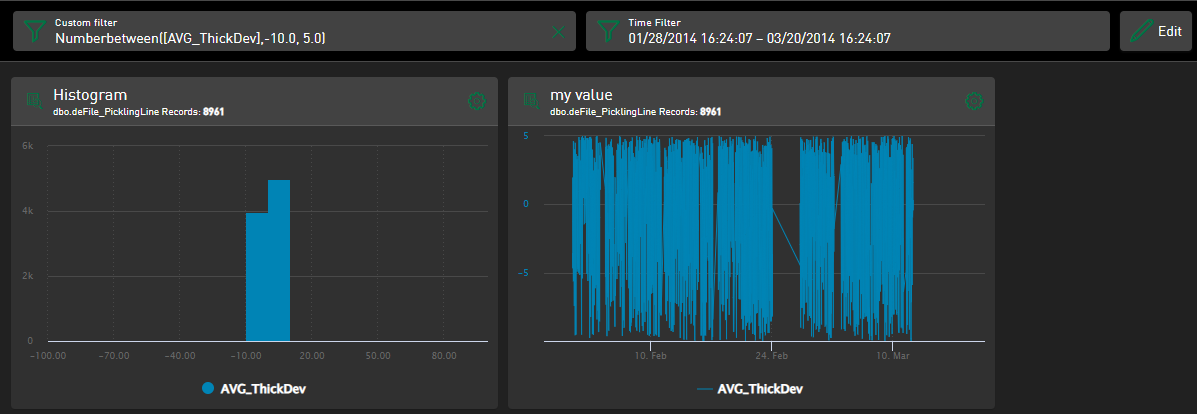Add specific filters to the URL of the dashboard or tile and define filter parameters for time or value specifications. An overview of the supported filter functions and parameters can be found in chapter Supported filter functions and parameters for URL filters.
Example call for the specification of a time range filter
Filter and parameter:
DateTimeRange([Start_Time],[Stop_Time],[Time_Zone])
Start_Time and Stop_Time have the format YYYY-MM-DDTHH:mm:ss.SSS.
The following is an example call for the dashboard filter specification for a specific date and time range:
http://ibaDaVIS-PC/dashboard/2?filter=DateTimeRange(“2025-04-21T00:01:00.000”,”2025-04-31T23:59:59.000”,”Europe/Berlin”)
The Start_Time and Stop_Time are specified according to the desired time zone. If you do not specify a time zone as a parameter, the Start_Time and Stop_Time are used as UTC times.
When the URL is called up, the filter defined in the URL is displayed in the dashboard filter line instead of the interactive filter.
Please note:
-
The filter parameters always refer to a time range filter. If no call for the time range (DateTimeRange()) is defined in the URL, the time range saved for the dashboard is used.
-
Spaces lead to errors in the execution of the function.
-
Control characters such as "" or commas are automatically replaced by URL-compliant expressions.
-
The maximum supported character length for a URL may vary depending on the browser. Microsoft Edge supports a maximum of 2,083 characters, while Google Chrome, Mozilla and Safari can handle much longer URL calls.
Further information can be found in the documentation of the browser used.
Combining filter functions
You can logically link different filter functions with the operators BoolEq, OR and AND.
Example of combining filter functions
-
And(BoolEq(...), DateTimeGt(...), ....)
-
Or(BoolEq(...), DateTimeGt(...), ...)
-
BoolEq([Input], 1)
Use of alias names for table columns
If you have assigned alias names for database table columns, a separate name resolution function is required for effective filtering of the table columns. The OneOf([nput], [AliasInputName]) function allows the alias name to be resolved within the filter call.
Example
StringContains(OneOf([nput], [AliasInputName]), "1234.5")
Deleting URL filter
-
To delete the URL filter, click on the cross.
The interactive filter saved with the dashboard is applied to the dashboard.
